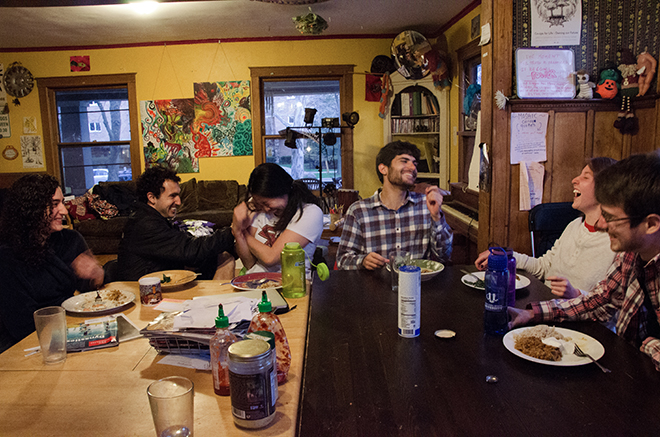
Photo by Rosalie Chan / North by Northwestern
In a bright yellow room, under a canvas of psychedelic swirls and colors, Weinberg senior Chelsea Phillips lounges on a brown velvet couch with a large skein of pink yarn on her lap, knitting away while a chorus of dishes clatters in the kitchen.
At 7 p.m. the dinner bell rings. Northwestern graduate student Stephanie Ger announces tonight’s dinner – kale with mango and lentil-rice salad – as residents of the three-story house start to emerge from their rooms to settle around a wooden dining table.
Twelve people live in the MOSAIC (Members of Society Acting in Cooperation) housing cooperative’s primary house, known as the “Zooo” not only for its address at 2000 Sherman Ave., but also for the abundance of animal pictures interspersed inside its walls.
Despite MOSAIC’s informal, homey feel, housing cooperatives are legally recognized organizations in which members pool their resources to lower the living costs each person would otherwise incur individually. MOSAIC belongs to the North American Students of Cooperation (NASCO), an organization of over 400 co-ops.
"That affiliation is something that hugely differentiates us from a random house of friends,” says Medill senior Leah Varjacques.
A group of Northwestern students who wanted to experiment with cooperative living and to bridge the Northwestern and Evanston communities started MOSAIC in 1998 in a house on Ridge Avenue. In 2004, they relocated to the Zooo.
The whole house gives off the appearance of a shared living space: scraps of paper on the coffee table, painted canvases on the walls and even a poster reading “Big Brother Is Watching You (if you’re into that ort of thing)” hanging on the common room ceiling.
“It’s a beautiful space of creativity and it’s really messy, but it’s because it’s so organic here,” says Weinberg senior Sasha Lishansky over the clinking of silverware and chatter of housemates.
“Everything in here has either belonged to us or has belonged to generations before us. Everything has such a rich history. Everything is made by people like me who have also lived here.”
Lishansky joined MOSAIC Spring Quarter of her sophomore year after seeing a flyer as a freshman. She applied, interviewed and still lives there as a Spring Quarter senior.
Phillips says living in the co-op is more about wanting to join the community than about needing a place to live. Each week, every member is responsible for doing four to five yours of assigned chores, which cover almost every task in the co-op, from cooking dinner to administrative duties.
“The way I think of the co-op is kind of modeling the society we want to see in the broader world,” says Weinberg senior Kelby Schuetz. “There is a big focus on sustainability, on socially conscious living ... and actually practicing democracy in our daily lives.”
On Sunday nights, members convene for meetings to discuss what needs to be accomplished within the co-op. They make decisions by consensus, where any individual has the power to veto the group’s idea.
“Just because something is doesn’t mean it needs to be,” says SESP junior Emiliano Vera. “We can change things according to what is good for the group.”
Meetings start with everyone sharing the highs and lows of their weeks, and end with what the community calls “appreciations,” or little slips of paper on which residents write positive comments about one another anonymously. Schuetz says these are “nice” and “sometimes necessary after stressful weeks.”
While in theory the co-op is open to anyone, in practice the residents tend to be Northwestern students and alumni. However, next year some young adults unaffiliated with the University will join the community.
Currently, the Zooo’s residents represent majors from across every Northwestern school except for the Bienen School of Music. Engineers make up the largest proportion of the community.
Though under its current egalitarian system the co-op doesn’t have an administrative board, Schuetz says that it will next year when MOSAIC expands to a second house on Elmwood Avenue, which will function as an independent co-operative with MOSAIC as the umbrella organization that oversees both houses.
For financial reasons alone, MOSAIC’s appeal makes sense.
“In terms of practical matters, we really benefit from economics of scale,” Phillips says. “I’m assuming I would spend much more [living anywhere else].”
Per month, members pay an average of $480 to $510 in rent depending on room size, $121 for common area food and five vegetarian dinners a week, and $50 for utilities. A $15 slush fund sponsors extra expenditures, from home improvements to house parties.
Schuetz says that what attracts people to MOSAIC is the community of open-minded and outwardly loving people.
“It’s a family,” says Northwestern graduate student Torey Kocsik.